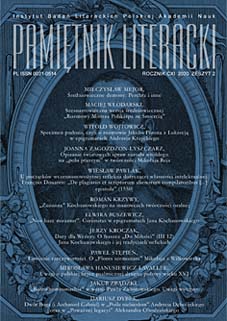„Zuzanna” Kochanowskiego na manowcach twórczości oralnej
Jan Kochanowski’s “Zuzanna” (“Susanna”) Goes Astray to Oral Creativity
Author(s): Roman KrzywySubject(s): Studies of Literature
Published by: Instytut Badań Literackich Polskiej Akademii Nauk
Keywords: Renaissance poetry; Jan Kochanowski’s “Zuzanna” (“Susanna”); artistry; orality; Biblical paraphrase
Summary/Abstract: The article contains a polemics with Dorota Vincůrková’s theses formulated in her study “Jan Kochanowski’s »Zuzanna« (“Susanna”) against the Vernacular Conventions of Hagiographic Songs” (“Literary Memoir” 20018, issue 4). Contrary to Vincůrková’s stance, the present author proves in the first part of the paper that it is hardly possible to state that the artistic means of expression employed by the Renaissance poet in his paraphrase of a fragment of “The Book of Daniel” provide for the artistry of the poem about Susanna. In the second part of the paper Krzywy undermines the validity of observations about Kochanowski’s imitating the “typically” oral means of expression which might, in the view of Vincůrková, bring the poem closer to the popular hagiographic songs and to the intellectual horizons of Elżbieta Radziwiłłowa, de domo Szydłowiecka, to whom the poem is dedicated. The author of the paper proves that with the exception of one fragment which calls the audience to hear the story, the remaining means of expression belong to a set of conventional rhetoric-literary ones. He is also convinced that too little is known about the piece addressee’s literary awareness to formulate theses about the artistic shape of “Zuzanna” (“Susanna”).
Journal: Pamiętnik Literacki. Czasopismo kwartalne poświęcone historii i krytyce literatury polskiej
- Issue Year: 111/2020
- Issue No: 2
- Page Range: 83-99
- Page Count: 17
- Language: Polish

